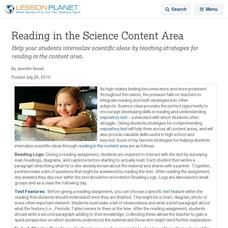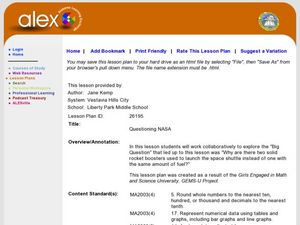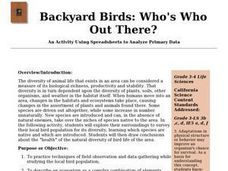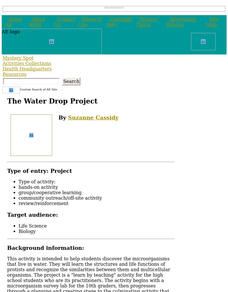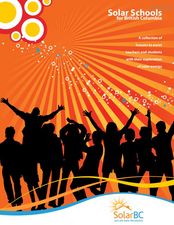Curated OER
Boston Harbor Cruise: A Shoreline Survey
The learners take a harbor cruise, photograph, and draw shore line features attending to evidence of human impact/consequences, and its cost on marine/land animal habitats vegetation, weather patterns, signs of erosion, and the water...
Berkshire Museum
Reduce, Reuse, and Recycle: Sorting Through Personal Choices
Raise children's awareness about the importance of conservation with this hands-on science lesson plan. Start by breaking the class into groups and having them collect trash from around the school or local park. Students then use the...
Environmental Protection Agency (EPA)
The Case of the Mysterious Renters
Upper-elementary kids examine the water usage in their own home, then use that data to solve a case in which a landlady is trying to determine how many people are living in an apartment being rented. Combine math, scientific method, and...
Curated OER
Reading in the Science Content Area
Help your students internalize scientific ideas by teaching strategies for reading in the content area.
Clean Up Australia
Why are Batteries Harmful to the Environment?
Open this lesson by reading together about primary and secondary batteries (such as nickel-cadmium cells), problems they can cause in the environment, and how humans can minimize the damage. Afterward, little ones examine a collection of...
Curated OER
Plants and Ecosystems
The relationships within and between ecosystems can be explored. after examining an area for living and non-living things students complete the same examination in the forest ecosystem. Students identify abiotic and biotic elements in an...
Curated OER
Too Heavy For Me
Students explore the different arrangement of air molecules in high and low air pressure masses. They compare the temperature of high and low pressure masses and discover how a barometer works.
Curated OER
Drip... Drop... Raindrops
Students demonstrate the steps of evaporation, cloud formation, and precipitation within the water cycle. They make and demonstrate how to use a hygrometer to record daily humidity and describe how rain, snow, and sleet form.
Curated OER
Questioning NASA
Space science and math collide in this inquiry that investigates launching times for antacid-tablet rockets! Upper elementary or middle school learners collect data as they launch these mini rockets. They apply concepts of place value...
National Geographic
Types of Volcanic Eruptions
Blow the roof off your classroom with this multimedia science lesson on volcanic eruptions. A short online video teaches young geologists about shield and composite volcanoes and explores the examples of Kilauea and Mt. Vesuvius, before...
Curated OER
Know Your Boundaries: Earthquake Lessons in the Classroom
With all the recent attention on Haiti, and now Chile, it is the perfect time to teach your students about earthquakes!
Curated OER
Backyard Birds: Who's Who Out There?
Students practice techniques of field observation and data-gathering while studying local bird population, describe ecosystem as complex combination of elements, which can affect or be affected by each other, and determine effects of...
Curated OER
The Water Drop Project
Students discover the microorganisms that live in water. They study the structures and life functions of protists and recognize the similarities between them and multicellular organisms.
Curated OER
One Square Meter
Learners examine various ecosystems using scientific inquiry. Using the local area, they assess the characteristics and conditions in one square meter. They report their findings in the form of a survey map and data sheet. They...
National Renewable Energy Laboratory
No Fossils in This Fuel
Yeast and sugar go beyond the pantry and into a fuel experiment. Use these common baking ingredients to assist your class in creating ethanol, a natural fuel. Pupils observe the process and gather information to elaborate on the...
Curated OER
We Care About Fire Safety
Students investigate the hazards of fires and how to best protect themselves and their family. In this home safety lesson, students examine the importance of a smoke detector and discover how many homes are missing them among their...
Curated OER
A Study of Erosion on the Weller School Playground
Students study an erosion problem which existed on the school playground from as many points of view as possible. The ultimate aim is to suggest and encourage implementation of a plan to prevent further damage to the playground.
Curated OER
The Planet Mars
Fifth graders gain knowledge about Mars and Earth. In this compare and contrast lesson, 5th graders use visual representations of the solar system to observe the characteristics of the planets. Students read fiction and nonfiction...
Curated OER
Energy Alternatives: Nature offers a solution
Students describe the pros and cons of different energy sources. In this earth science lesson, students respond to survey questions and discuss each other's opinion about the issue. They research an energy source of their choice and...
Curated OER
Denali Park Topographic Maps
Students construct a topographic map of the Denali National Park. They identify different elevations and record historic landmarks in student science journals.
Curated OER
Wiggle Worms
First graders investigate worms, collect and analyze data. In this worm and data lesson, 1st graders listen to Chick and Duckling from the Macmillan/McGraw-Hill reading series. They conduct experiments with worms, collect simple data,...
Curated OER
Panning for Gold and Magnetite
Students pan for minerals in a stream and discover why magnets attract magenitite but not nonmagnetic grains. They participate in the actual panning process and bag samples to be examined in class. Students recognize minerals by color...
Curated OER
Electricity--More Power to Ya!
Fourth graders use research tools to access and synthesize information. They gather and manipulate data using technology. Research and study the components of an electrical circuit. Create a brochure that demonstrates knowledge of how to...
Curated OER
Hunting Invertebrate Fossils in the Classroom
Students acquire a general knowledge of fossils and paleontology, the study of evidence of life in the past and identify the major invertebrate groups (phyla) commonly found in the fossil record.





